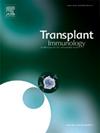Prophylactic use of eculizumab for ABO-blood type incompatible kidney transplantation with extremely high ABO-blood type antibody titer: A two case report
IF 1.4
4区 医学
Q4 IMMUNOLOGY
引用次数: 0
Abstract
We report two cases of ABO-incompatible living-donor kidney transplantation (ABOi KT) performed in patients with exceptionally high ABO antibody titers. Both donor and recipient refused blood transfusions for religious reasons, limiting the use of plasma exchange. The desensitization protocol consisted of plasmapheresis (PP) using albumin solution, rituximab (300 mg), and high-dose intravenous immunoglobulin (IVIg; 4 g/kg). Despite aggressive desensitization procedure, ABO antibody titers did not go down to our acceptable upper limit of 1:64; the titer at transplantation was 1:256 in both cases. Given the high risk of acute antibody-mediated rejection (ABMR), the anti-complement C5 component monoclonal antibody (eculizumab; 900 mg) was administered prophylactically before graft reperfusion in order to inhibit complement activation. For both cases, postoperative courses were unremarkable, without any rejection episodes over one year. No additional doses of eculizumab were administered post-transplantation. We suggest that ABOi KT may be considered safe once early post-transplant ABMR is suppressed, allowing for immunological accommodation. Furthermore, despite the elevated antibody titers, the prophylaxis with eculizumab successfully inhibited early post-transplant complement activation, protecting kidney transplants from ABMR. These findings support the prophylactic use of eculizumab administration at the time of transplantation in high-risk cases of ABOi KT.
对abo血型不合且abo血型抗体滴度极高的肾移植预防性应用依珠单抗:两例报告
我们报告了两例 ABO 抗体滴度特别高的患者进行 ABO 不相容活体供肾移植(ABOi KT)的病例。由于宗教原因,供体和受体都拒绝输血,限制了血浆置换的使用。脱敏方案包括使用白蛋白溶液的血浆置换术(PP)、利妥昔单抗(300 毫克)和大剂量静脉注射免疫球蛋白(IVIg;4 克/千克)。尽管进行了积极的脱敏治疗,ABO 抗体滴度仍未降至我们可接受的 1:64 上限;两例患者移植时的滴度均为 1:256。鉴于急性抗体介导的排斥反应(ABMR)的高风险,我们在移植物再灌注前预防性地使用了抗补体C5单克隆抗体(eculizumab;900毫克),以抑制补体激活。两个病例的术后疗程均无异常,一年内未发生任何排斥反应。移植后没有再使用额外剂量的依库珠单抗。我们认为,一旦移植后早期ABMR被抑制,ABOi KT就可以被认为是安全的,从而可以进行免疫调适。此外,尽管抗体滴度升高,但使用依库珠单抗预防性治疗成功抑制了移植后早期补体激活,保护肾移植免受ABMR的影响。这些研究结果支持在 ABOi KT 高风险病例移植时预防性使用依库珠单抗。
本文章由计算机程序翻译,如有差异,请以英文原文为准。
求助全文
约1分钟内获得全文
求助全文
来源期刊

Transplant immunology
医学-免疫学
CiteScore
2.10
自引率
13.30%
发文量
198
审稿时长
48 days
期刊介绍:
Transplant Immunology will publish up-to-date information on all aspects of the broad field it encompasses. The journal will be directed at (basic) scientists, tissue typers, transplant physicians and surgeons, and research and data on all immunological aspects of organ-, tissue- and (haematopoietic) stem cell transplantation are of potential interest to the readers of Transplant Immunology. Original papers, Review articles and Hypotheses will be considered for publication and submitted manuscripts will be rapidly peer-reviewed and published. They will be judged on the basis of scientific merit, originality, timeliness and quality.
 求助内容:
求助内容: 应助结果提醒方式:
应助结果提醒方式:


